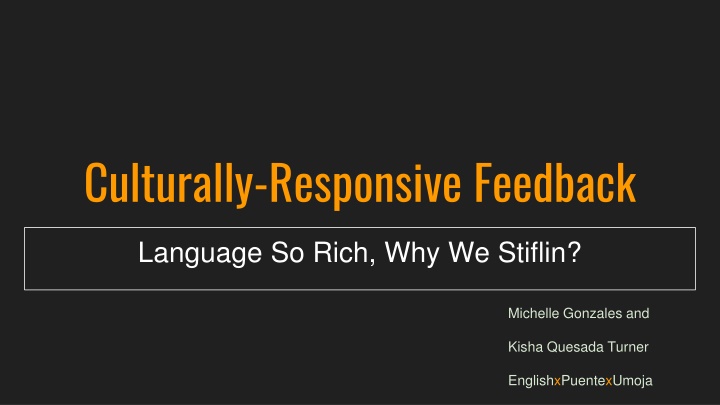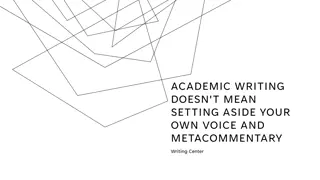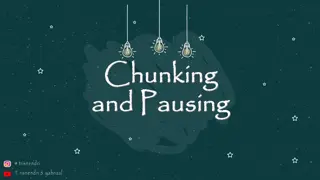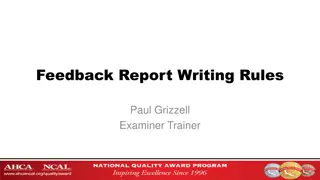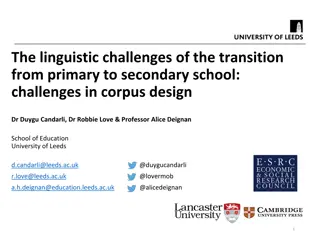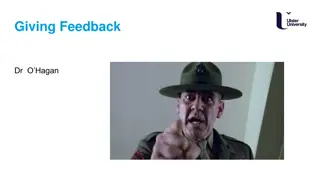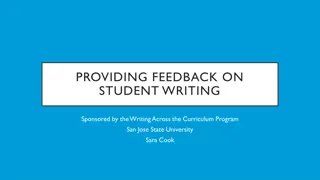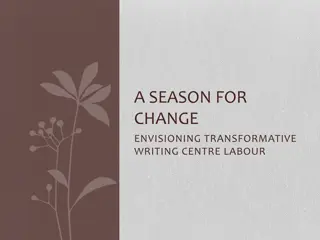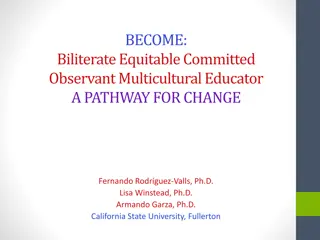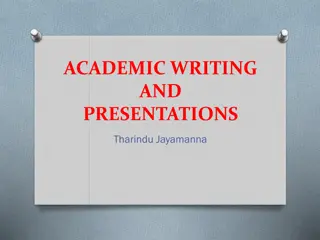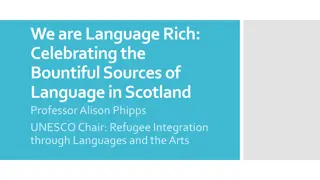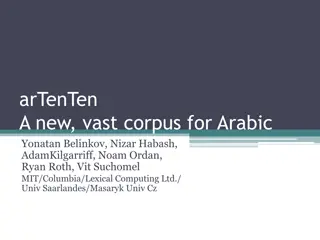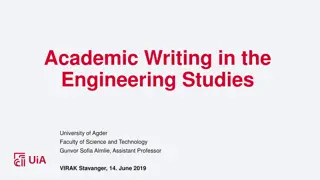Embracing Linguistic Diversity in Academic Writing Feedback
This resource explores the importance of embracing linguistic diversity in academic writing feedback, aiming to de-stigmatize other English varieties, expand definitions of American Edited English, and address the racial and class implications of feedback. It discusses the impacts of culturally-insensitive feedback on students and educators and advocates for inclusivity in language assessment.
Download Presentation

Please find below an Image/Link to download the presentation.
The content on the website is provided AS IS for your information and personal use only. It may not be sold, licensed, or shared on other websites without obtaining consent from the author.If you encounter any issues during the download, it is possible that the publisher has removed the file from their server.
You are allowed to download the files provided on this website for personal or commercial use, subject to the condition that they are used lawfully. All files are the property of their respective owners.
The content on the website is provided AS IS for your information and personal use only. It may not be sold, licensed, or shared on other websites without obtaining consent from the author.
E N D
Presentation Transcript
Culturally-Responsive Feedback Language So Rich, Why We Stiflin? Michelle Gonzales and Kisha Quesada Turner EnglishxPuentexUmoja
Icebreaker: Share the name of a non-edited English language that you enjoy speaking or feel at home in Or Share a non-edited English word that you enjoy speaking or feel at home in. TYPE YOUR RESPONSE IN THE CHAT
Why We Here? 1. Purpose of our session is to de-stigmatize other Englishes (e.g. AAVE), expand the definition of American Edited English, and familiarize ourselves with different Englishes students can use effectively in their college writing. 2. To recognize the damage inflicted on students grades when we hold too firmly to outdated ideas about what constitutes academic writing. 3. To recognize that our feedback can have stifling racist and classist implications.
Glossary AEE - American edited English also known as standard English AAVE - African American vernacular English BVE - Black vernacular English Code-meshing Code-switching Cultural wealth Cultural deficit model Spanglish
Mr. Milowicki https://phys.org/news/2013-01-red-pen-instructors-negative-response.html
Types of feedback that we give 1. Verbal and non-verbal e.g., during class discussions
Ramifications of culturally-insensitive feedback 1. Students: trauma, feeling silenced, discouraged, student failure due to teaching flaws and/or hyper-focus on grammar and mechanics 2. Teachers: failure to see the student and the students ideas 3. What the data tells us: a. Linguistic racism or being judged based on AEE, i.e., White Mainstream English b. Can position the student in a deficit position c. Separation of language, race, and identity d. Creativity loss e. Educators & other feedback-givers lose opportunities to learn a thing or two f. Respeck. 3a-f: Baker-Bell et al
Students Right to Their Own Language 1974 Conference on College Composition and Communication org within NTCE: National Council of Teachers of English Revised in 2005 Some individuals put it into practice Deficit models remained the norm
CCC Statement We affirm the students' right to their own patterns and varieties of language -- the dialects of their nurture or whatever dialects in which they find their own identity and style. Language scholars long ago denied that the myth of a standard American dialect has any validity. The claim that any one dialect is unacceptable amounts to an attempt of one social group to exert its dominance over another. Such a claim leads to false advice for speakers and writers, and immoral advice for humans. A nation proud of its diverse heritage and its cultural and racial variety will preserve its heritage of dialects. We affirm strongly that teachers must have the experiences and training that will enable them to respect diversity and uphold the right of students to their own language.
This Aint Another Statement. This Is a Demand for Black Linguistic Justice July 2020 Policy Demands by 6 Black language scholars and persons with lived experiences The learning of standard English has historically been obligatory despite our knowledge that linguistic shaming and dismissal of Black Language has a deleterious effect on Black Language speakers humanity (Smitherman, 2006; Rickford & Rickford, 2000). We must acknowledge that Black students language education continues to perpetuate anti- Black linguistic racism (Baker-Bell, 2020) and creates a climate of racialized inferiority toward Black Language and Black humanity.
Culturally-Responsive Feedback Faculty adjust to cultural shift Expand definition of AEE Familarize selves with AAVE grammar Familarize selves with common Eng learner errors Rethink error
Culturally-Responsive Feedback Recognize when such errors create an accent Recognize different kinds of clear and effective prose Tame your inner grammar cop Quit stunting on students
How do we provide and grade student work and meet the course outline mandates?
We distinguish between feedback on writing vs feedback on content.
English 1A Course Outline Write multiple-paragraph papers that: 1. Accurately and appropriately respond to a given assignment; 2. Develop a relevant, focused thesis; 3. Are well-organized and coherently move from coordinating to subordinating points; 4. Are well-developed with sufficient and relevant evidence; 5. Synthesize facts and ideas originating outside his/her direct experience to develop and support a thesis; 6. Demonstrate stylistic choices in tone, syntax, and diction; 7. Use standard American English correctly;
Contradictions? 6. Demonstrate stylistic choices in tone, syntax, and diction; 7. Use standard American English correctly;
History 1: Writing Guidance English 1A not prerequisite or strongly recommended Writing Guidance from Course Outline Writing: Three 500-750 word essays on the major themes and developments in Western Civilization as presented in textbook chapters, audio-visual material, or primary sources.
History 1: Measurable Objectives A. Identify and correctly use basic historical terminology B. Identify, analyze, and interpret primary and secondary sources; C. Analyze the concept and various definitions of the West; D. Analyze and explain multiple causes and outcomes of historical events and developments related to western civilization; E. Identify and distinguish the major eras in the history of western civilization; F. Identify and distinguish the physical and political geography of western civilization; Analyze and explain the interaction of economic, social, cultural and political developments in response to changing historical circumstances; G. Identify and explain the historical significance of major discoveries and developments in technology, science, art, architecture, and literature. H. Identify and explain the historical significance of major discoveries and developments in technology, science, art, architecture, and literature.
Psych 1: Writing Guidance Eligibility for 1A strongly recommended From Typical Assignments Writing: Research and write a term paper pertaining to one of the primary topic areas discussed in this course. Cite references in proper APA format and include a reference section. 1. After viewing a selected video, such as One Flew Over the Cuckoo's Nest, be prepared to write a short paper concerning the major issues and problems of mental institutions as portrayed in the film. 2. Based on the readings concerning mnemonic devices, write a brief summary report discussing how visual imagery can be used to enhance memory recall. 3. Write a brief paper discussing which approach to psychotherapy seems to have the most practical value and application to treatment of psychological disorders.
Pysch 1: Measurable Objectives 1. define the various theoretical perspectives that have shaped the study of psychology 2. contrast the unifying themes that underlie the field of psychology 3. distinguish between the goals of scientific psychology and common sense 4. evaluate the various psychological research methods 5. discuss the importance of ethical principles in research 6. summarize the key functions of different brain components 7. describe the role of heredity and environment on behavior 8. describe the processes involved in sensation and perception 9. distinguish between the various states of human consciousness 10. identify the differences between various theories of learning 11. describe the process involved in the encoding, storage and retrieval of memories 12. discuss the theories of intelligence and the goals of psychological testing 13. distinguish between the two major categories of human motives 14. describe the basic components of emotion 15. explain how 16. define the construct of personality 17. describe the theoretical approaches to understanding abnormal behavior 18. describe the various models of psychotherapy 19. discuss the situational influences on behavior 20. describe psychological differences and similarities between groups based on gender, sexuality, social, or cultural grouping 21. apply concepts and theories to personal developmentbiological and environmental factors contribute to developmental differences
ANTR 1: Writing Guidance Before entering this course, it is strongly recommended that the student should be able to: -Eligibility for ENG 1A 1. Write effective summaries of texts that avoid wording and sentence structure of the original 2. Organize coherent essays around a central idea or a position 3. Provide appropriate and accurate evidence to support positions and conclusions 4. Produce written work that reflects academic integrity and responsibility, particularly when integrating the exact language and ideas of an outside text into one s own writing 5. Utilize effective grammar recall to check sentences for correct grammar and mechanics
ANTR 1: Measurable Objectives A. Describe the scientific process as a methodology for understanding the natural world. B. Define the scope of anthropology and discuss the role of biological anthropology within the discipline. C. Identify the main contributors to the development of evolutionary theory. D. Explain the basic principles of Mendelian, molecular and population genetics. E. Evaluate how the forces of evolution produce genetic and phenotypic change over time. F. Demonstrate an understanding of classification, morphology and behavior of living primates. G. Summarize methods used in interpreting the fossil record, including dating techniques. H. Recognize the major groups of hominin fossils and describe alternate phylogenies for human evolution. I. Identify the biological and cultural factors responsible for human variation. J. Deconstruct the biological concept of race.
Summary of Course Outline Review Assumption of college instructors: Writing instruction in English is the foundation for reading and writing in other courses Facts: not all courses require Eng 1A Some courses strongly recommend Varying degrees of guidance about writing Writing guidance not usually addressed in objectives Usually found in Typical Assignments Educated Opinion: We are assessing too narrowly By honoring students stylistic choices in tone, syntax, and diction, assessment can be applied more broadly
Quesada Turner - English 7 - Late Spring 2020 Prompt: Create a portfolio assignment in which you choose an issue or controversy that future English 7 students may research and write about. To do this, first select a current controversy. Then, find five texts that make an argument about that issue; next, come up with a list of questions for writers to debate; and, finally, create a memo to the students that explains why you chose the topic, what you hope they ll get from it, and any advice for writing and researching.
Students Example: Memo can be found here.
Works Cited Baker-Bell, April, et al. This Ain t Another Statement: This is a DEMAND for Black Linguistic Justice! Conference on College Composition and Communication. 2020, https://cccc.ncte.org/cccc/demand-for-black-linguistic-justice. Accessed 19 Oct. 2020. Conference on College Composition and Communication. Students Right to Their Own Language. CCCC, 1974, https://prod-ncte- cdn.azureedge.net/nctefiles/groups/cccc/newsrtol.pdf.
